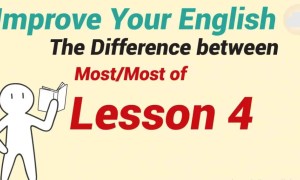un/ in/ dis 的字根搭配偶尔会出现在多益考试的选择题里,一连串的相似字都快让人抓狂了!
所以这次小编著重在这几个常见的否定字首并一一打击,让它不再是你失分的关键!
un-
常见的动词前否定:
unlock (v.) 打开、解开(常常会和 lock 搞混意思,lock 是上锁,unlock 则是有打开之意)
undress (v.) 脱下
uncover (v.) 揭开、揭露
Mom kept worrying if she had left the door unlocked on our way home.
妈妈在回家的路上一直担心门没有锁。
She slipped into bed as soon as soon as she undressed herself.
她一脱下衣服,就爬上床睡。
She uncovered her secrets after she got drunk last night.
昨晚喝醉之后,她向我们坦露她的秘密。
常见的形容词前否定:
uncomfortable (adj.) 不舒服的、难受的、不自在的
unreal (adj.) 不真实的、虚幻的、奇异的
uncommon (adj.) 罕见的、不常有的
When he entered the living room, his wife sat still, with an uncomfortable silence.
当他走进客厅,他的妻子静静地坐着,伴随着令人不自在的沉默。
What happened to Harry was so unreal that Ron cannot completely believe it!
发生在哈利身上的事太不真实了,荣恩根本不相信!
It is uncommon for such a strong man to get this kind of disease.
如此强壮的男人却得了这种疾病,真是罕见。
in-
由 in 衍生出的相关否定字首还有 im、il、ir 等,而要选择用哪一个字首则视后面单字的开头字母而定。
常见的 in 否定:
informal (adj.) 非正式的、非正规的、随意的 (常会误用成 unformal!要特别小心!)
incorrect (adj.) 不正确的、不适当的
invisible (adj.) 看不见的、无形的
The school authorities claimed that they would not accept any informal pleas from students.
校方表示将不会接受学生的任何非正式申诉。
It turned out that the statistics might be incorrect.
结果显示统计数字可能有误。
This magic cloak can make people invisible.
这件魔法斗篷能让人隐形。
什么时候使用 im 字首表达否定?
当后面接的单字为 b, m, p 开头时,就要使用字首 im:
imbalance (n.) 不平衡、失调
immortal (adj.) 不朽的、永生的、永存的
improper (adj.) 不正当的、不合适的
The global wealth imbalance reflects that the distribution of resources is extremely unequal.
当今全球的财富失衡反应严重的资源分配不对等。
Some people believe that the spirit is immortal.
有些人相信灵魂不灭。
Eating and chatting loudly in class are considered improper behaviors.
课堂中吃东西或大声聊天是相当不恰当的行为。
什么时候使用 il 字首表达否定?
后面接的单字为 l 开头时,要表达否定则在字首加 il:
illegal (adj.) 非法的、违法的
illiterate (adj.) 文盲的、不识字的
illogical (adj.) 不合逻辑的、不明智的、无理由的
It’s illegal to carry guns in our country.
在我们国家,携带枪枝是违法的。

The educational organization has long been dedicated to lowering the amount of illiterate people in this country.
这个教育组织致力于降低该国家的文盲人口数量。
I lost faith in this candidate for his statements were quite illogical and unconvincing.
这位候选人的言论完全没有逻辑也毫无说服力,我已经对他失去信心了。
什么时候使用 ir 字首表达否定?
后面接的单字为 r 开头时,要表达否定则在字首加 ir:
irregular (adj.) 不规则的、不合常规的 (常会误用为 unregular ! 要特别注意!)
irrelevant (adj.) 不相关的
irrecoverable (adj.) 无法挽回的
The test is to examine the students’ understanding on irregular verbs.
这项考试是为了检测学生对不规则动词的理解。
The whole debate seemed to be irrelevant to the present issue.
整场辩论似乎变得和目前的议题毫不相干。
The policy has caused irrecoverable environmental damage since it was carried out last year.
自从去年这项政策实施后,环境的破坏俨然到了无法挽回的局面。
*补充*
有些单字虽然是 b, m, p 开头,但却不用加 i 再重复字首,如下:
unpopular、unlawful、unmatched…由这些可以看出, un 开头的否定不管后面字词的开头为何皆不须变化!不要和 in 的否定用法搞混了唷!
dis-
disagree (v.) 不同意、反对
disrespectful (adj.) 不尊重的、无礼的
disloyal (adj.) 不忠诚的
Jenny’s parents strongly disagree with her decision of going abroad alone.
珍妮的父母强烈反对她独自出国的决定。
It may be kind of disrespectful to refuse his sincere invitation.
拒绝他真诚的邀约可能有点无礼。
Some fans thought this player was disloyal to his team while some took this as a common phenomenon in NBA.
有些粉丝认为这位球员对球队不忠诚,但有些人认为这在 NBA 中是家常便饭的现象。
特别注意:有些单字一旦词性转换,否定字首就会跟着改变!
这部分有时会出现在考题中,可能是考词性也可能是考字义,要小心哦!
同样表达否定,但词性不同,字首就不同:
unfortunate (adj.) 不幸运的、倒楣的、遗憾的 → misfortune (n.)
The unfortunate kid was sent to a remote orphanage afterwards.
那个不幸的孩子后来被送去偏僻的孤儿院了。
*延伸*
要表达「不幸」、「倒楣」之意的名词时,不能用 unfortune(没有这个字哦!)
misfortune 才是名词,但特别的是也没有 misfortunate 这种字来当形容词哦!
反而 misfortuned 和 unfortunate 是同义字。
unequal (adj.) 不相等的、不平等的 → inequality (n.)
常见的词汇搭配有:
unequal treatment 不平等待遇、unequal size 不相等大小、unequal exchange 不等值交换
income inequality 收入不平衡、gender inequality 性别不平等、economic inequality 经济不平等
unjust (adj.) 不公平的、不公正的 → injustice (n.)
unjust enrichment 不当得利、unjust decision 不公正的决定、unjust laws 不公正的法律
Justice will prevail over injustice.
正义将战胜非正义。
unable (adj.) 不能的、不会的→ inability (n.)
be unable to 不能/不会/无法做某事
be unable to put words together 一句话都说不清楚







